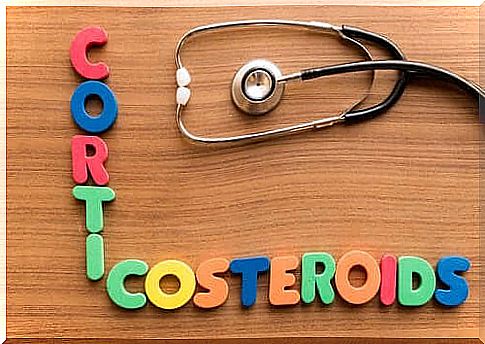When Are Corticosteroids Used?
Since corticosteroids are involved in numerous organic processes, they also have many side effects. For example, a significantly higher risk of infection has been described because it is an immunosuppressant.

Corticosteroids, also known as corticoids, are drugs with the same chemical structure as natural steroids that are synthesized in the brain. This is why these chemical substances, like hormones, are involved in numerous organic processes.
These processes include, for example, the metabolism of nutrients, such as protein or carbohydrates, as well as inflammatory processes. Corticosteroids also play a role in the immune system, as we will see in more detail later. They are also involved in the stress response.
These medicines can only be obtained with a prescription because they have very powerful effects. The dose and intake must be checked by a doctor, as misuse of these drugs can be very dangerous.
As the article progresses, you will see that corticosteroids are used for many diseases. They are prescribed, for example, in the treatment of rheumatic diseases or Crohn’s disease.
When are corticosteroids used?

As mentioned briefly at the beginning, these are drugs that are used to treat numerous diseases. That is why they are available in a wide variety of pharmaceutical forms.
Corticosteroids are very effective, for example, in chronic lung diseases such as EPOC , but are also used for the selective treatment of chronic bronchitis. For these diseases, inhalers are available that allow administration via the respiratory tract.
In addition, there is also a classic formulation in tablet form that is administered orally. Tablets are used in particular for inflammatory diseases, for example rheumatic diseases such as rheumatoid arthritis, arthrosis or lumbar pain. However, an intramuscular delivery format also exists for joint pain relief.
Corticoids are also very effective in treating psoriasis, eczema, and various types of dermatitis. For these diseases , special ointments are available for external treatment.
Corticosteroids are also used in autoimmune diseases, for example lupus erythematosus.
Corticosteroids: pharmacological effect
We have already mentioned that corticoids impair numerous processes in the organism. They therefore have a wide variety of pharmacological effects, the most important of which are listed below:
- Metabolism of carbohydrates, proteins, lipids, water and electrolytes: Corticoids increase the sugar level and the pyruvate level in the blood. They are also involved in fat distribution and increase appetite. They also hold back sodium and water, but they promote the excretion of potassium and hydrogen. Corticoids can cause osteoporosis and myopathies.
- Effects on the cardiovascular system: Corticoids promote the formation of edema.
- Immunosuppression: They weaken the immune system and are therefore very efficient, especially in the case of autoimmune diseases.
- Anti-inflammatory effects: Corticosteroids reduce symptoms caused by inflammation, such as redness, heat, pain and edema. They also inhibit the release of histamine.
Side effects caused by corticosteroids

Like virtually all commercially available drugs, corticosteroids have various side effects that have been tested in clinical trials with these drugs.
Since they are involved in many organic processes, the side effects are also widely spread. For example, a significantly higher risk of infection has been described because immunosuppressants are involved.
Other common side effects of these medicines are:
- Musculoskeletal complaints: muscle pain, osteoporosis and bone necrosis
- Pancreatitis and stomach ulcers
- high blood pressure
- acne
In addition to these reactions , corticosteroids can have other side effects. In some cases, psychological disorders such as depression, psychosis or sleep disorders also occur. The following problems can also arise: cataracts, glaucoma or endocrine disorders (diabetes, obesity or reduced growth, as corticosteroids also have an effect on growth hormone).
Conclusion
Corticoids are drugs that are related to the steroid hormones in the organism. They therefore have numerous effects on the patient. These are very powerful medicines that must be taken with great caution. Follow your doctor’s recommendations carefully and under no circumstances self-medicate with these drugs.









